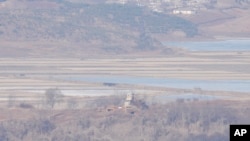North Korea is abandoning its policy of seeking reunification with South Korea.
North Korean leader Kim Jong Un called for the constitution to be revised to say that the South is the country’s “primary foe and invariable principle enemy” during a speech Monday before the Supreme People’s Assembly, the North’s rubber-stamp parliament, according to state-run Korean Central News Agency.
Kim said the constitution should also include plans for “occupying, subjugating and reclaiming” the South if another war breaks out between the two bitter rivals.
He said North Korea has no intentions of starting a war, but has no intentions of avoiding one either.
The parliament announced Tuesday that it was abolishing two government agencies responsible for reunification and economic cooperation initiatives, as well as the agency that promoted South Korean visits to the North’s Mount Kumgang resort.
Kim ordered the destruction of all symbols of North-South reunification, including the “Monument to the Three Charters for National Reunification” in the capital Pyongyang built by his late father, Kim Jong Il, which the younger Kim described as “an eyesore.”
South Korean President Yoon Suk Yeol blasted Kim’s comments Tuesday during a meeting with his cabinet as “anti-national and anti-historical” and vowed that North Korea will be punished “multiple times as hard” if it attacks the South.
The Korean Peninsula was split between the communist-ruled North and the U.S.-backed South after Japan’s decades-long colonial occupation ended in 1945 with its surrender in World War II.
War broke out between the North and South in 1950, ending in 1953 with an armistice that has left the two sides in a technical state of war.
Tensions between North and South Korea have worsened in recent years as the North intensified its ballistic missile testing program and vowed to expand its nuclear weapons arsenal.
Some information for this report came from The Associated Press, Reuters.





